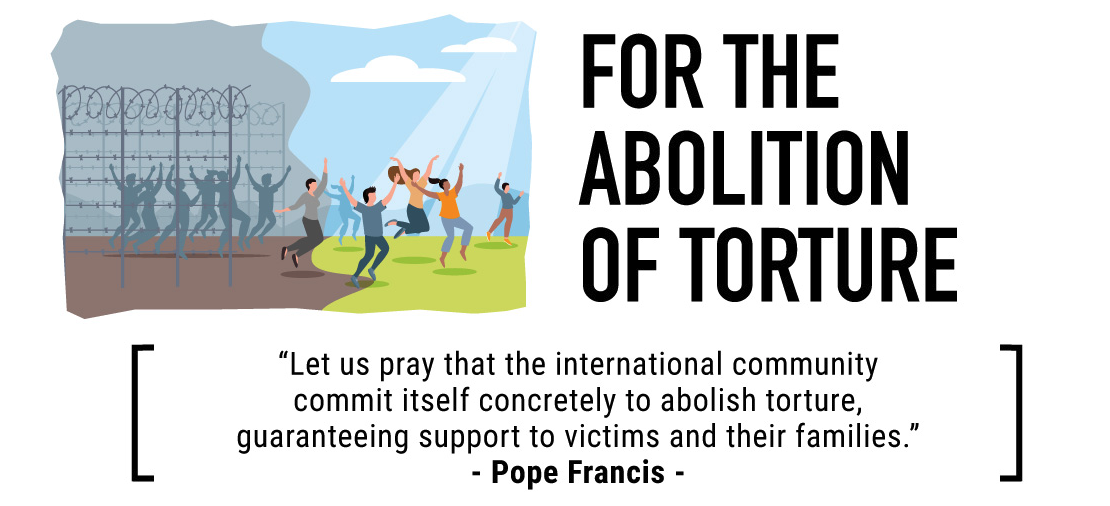The new Pope Video contains a powerful call for the abolition of torture.
The Holy Father condemns not only the most violent forms of torture but also those that are “more sophisticated, such as degrading someone, dulling the senses, or mass detentions in inhumane conditions”.
Horrified that it is currently still practised, the Pope calls on the international community to “commit itself concretely to abolish torture, guaranteeing support to victims and their families”.
“How is it possible that the human capacity for cruelty is so huge?” Pope Francis asks with horror.
The Holy Father’s new prayer intention for June, which is entrusted to the entire Catholic Church through the Pope’s Worldwide Prayer Network, is an appeal for the abolition of torture in all of its forms throughout the world.
“Torture is not past history,” explains Pope Francis. “Unfortunately, it’s part of our history today.”
He also underlines that as well as violent forms of torture, other more sophisticated methods are used today.
The timing of his condemnation of the practice, and the prayer intention itself, is not accidental.
Monday June 26 is the United Nations International Day in Support of Victims of Torture – it was on this date in 1987 that the UN Convention Against Torture and Other Cruel, Inhuman or Degrading Treatment or Punishment went into effect. The convention was ratified by 162 countries after its adoption in 1984.
Images of prisoners in inhumane conditions – tied to a chair, hooded, hands bound – open this month’s Pope Video, which reconstructs places and current practices of torture in various parts of the world.
Pope Francis says that whoever tries to reduce a person to a “thing” loses his or her own humanity first.
This is what also happened to those who tortured Jesus, when they scourged him, beat him and mocked him.
Jesus experienced torture during his Passion and died bearing the signs of that torture: the wounds of the thorns and the whips, the bruises from the punches, the welts of the ropes that bound his wrists.
The video contains close-ups of the image of the Ecce Homo in the shrine of Mesoraca in Crotone, Italy. These images are impressive because of how real they are.
Torture is a practice dating back to antiquity. In the 18th and 19th centuries, western countries officially abolished its official use through the judicial system.
Today, it is entirely prohibited by international law. Nevertheless, it continues to be practised in many countries.
Since 1981, the United Nations Fund for Victims of Torture has assisted an average of 50,000 victims of torture each year in countries in every corner of the globe.
Of course, torture tends to occur in conflict zones. Such is the case with Russia’s aggression against Ukraine, where there have been reports of acts of torture perpetrated by Russian soldiers against the Ukrainian military and civilians.
In addition, and in part due to the advent of new technologies, the use of certain non-physical forms of torture, such as psychological torture, has increased.
Aggravating the issue is the persistent lack of accountability for torture and ill-treatment on a global scale, partly caused by systemic denial, the obstruction and the deliberate evasion of responsibility on the part of public authorities, which makes it difficult to document and estimate the number of victims.
This, then, is the Pope’s appeal to the entire international community, that it “commit itself concretely to abolish torture, guaranteeing support to victims and their families.”
Father Frédéric Fornos SJ, international director of the Pope's Worldwide Prayer Network, said: “No matter what the reasons are, torture can never be justified. Pope Francis has said this clearly many times.
“For example: ‘Torturing a person is a mortal sin! Christian communities must commit themselves to helping victims of torture’ (Tweet from June 26 2018).
For Christians, Jesus Christ is the face of God. Throughout history, he has drawn near to all victims of torture through his own Passion.
Because of this, as Pope Francis says in Fratelli Tutti: “Every act of violence committed against a human being is a wound in humanity’s flesh.” (FT 227).
This month of prayer and action for the abolition of every form of torture, whether of detainees, prisoners, or abducted persons, is also an appeal to guarantee the support of the victims and their families.

Pope: ‘Let us put a stop to this horror of torture!’
